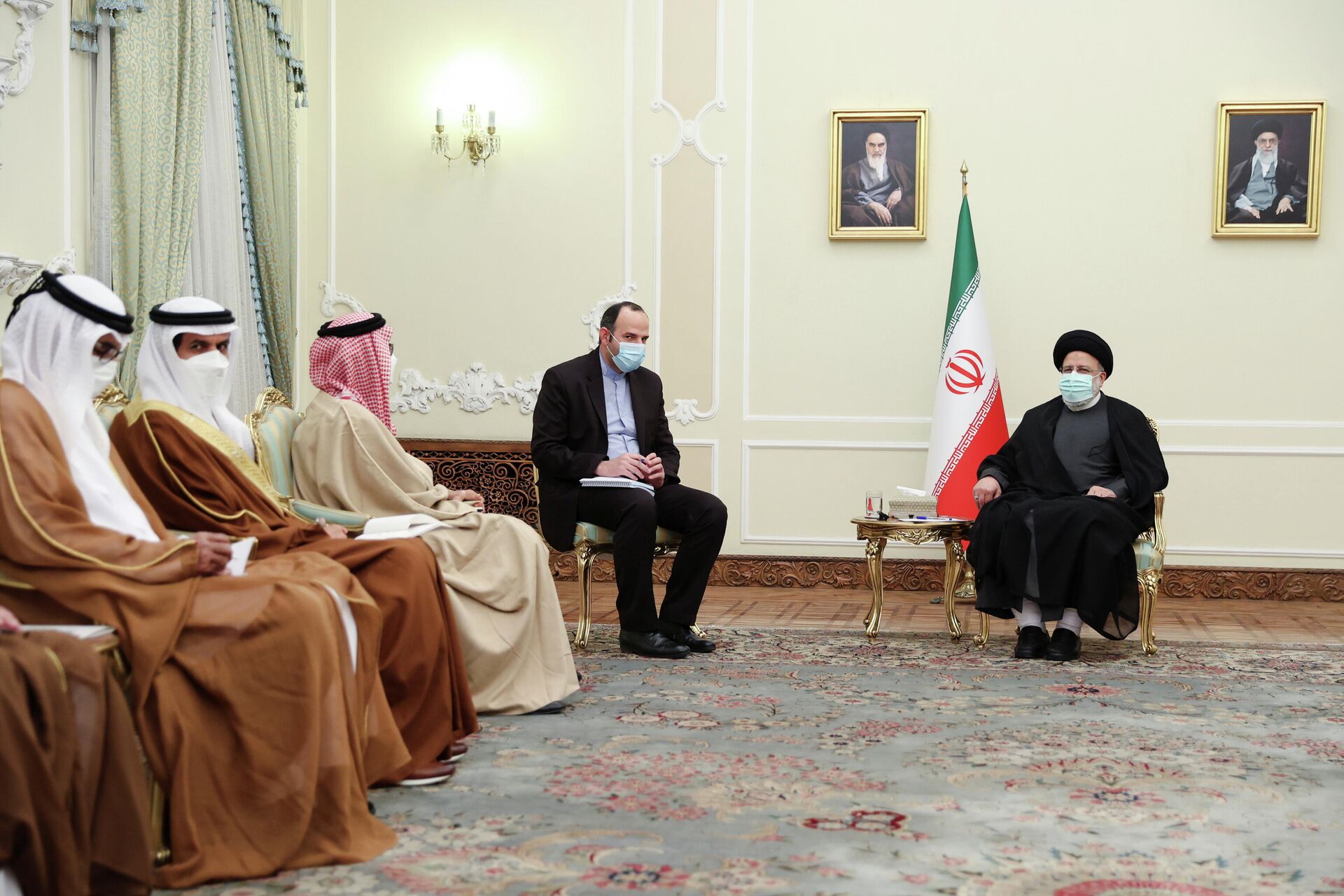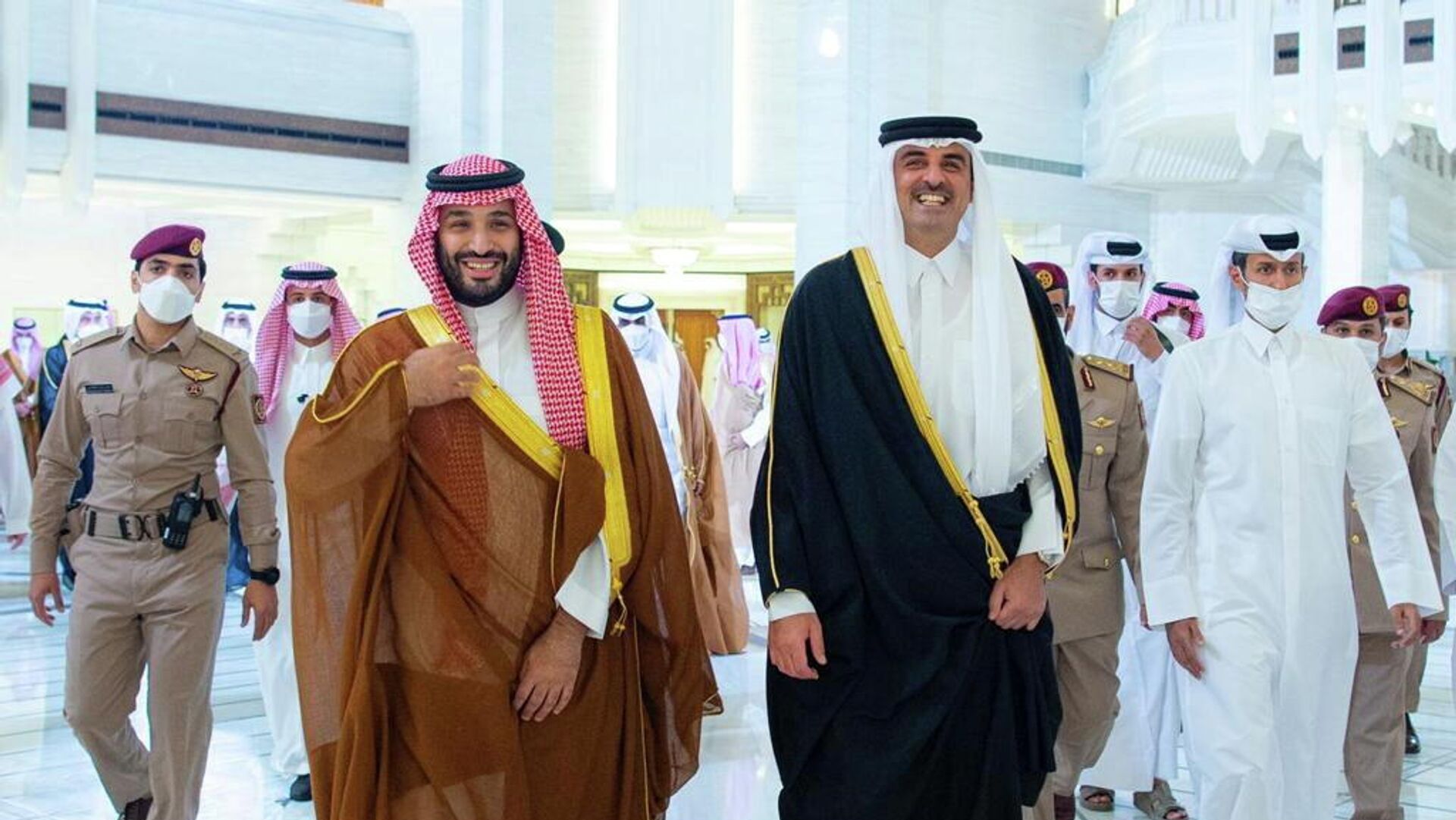MBS’ Pre-GCC Summit Tour Takes Him to Doha for First Time Since Lifting Qatar Boycott
22:44 GMT 08.12.2021 (Updated: 20:36 GMT 19.10.2022)
Subscribe
As part of his tour of the other Persian Gulf states this week, Saudi Crown Prince Mohammed bin Salman (MBS) touched down in Doha, Qatar, on Wednesday, marking the leader’s first visit since a four-year boycott by other Arab states against the country was lifted in January.
The de facto Saudi leader arrived in Doha on Wednesday, where he was greeted on the tarmac by the Qatari emir, Sheikh Tamim bin Hamad al- Thani, the Saudi Press Agency reported. The two men exchanged seemingly warm greetings that gave little hint of the hostilities only barely paved over by a January reconciliation deal.
#فيديو | سمو #ولي_العهد يصل العاصمة القطرية الدوحة وفي مقدمة مستقبليه سمو أمير دولة #قطر.#ولي_العهد_في_قطر #واس pic.twitter.com/fwGmwfs4Xx
— واس الأخبار الملكية (@spagov) December 8, 2021
“The relations of brotherhood and cooperation between Qatar and Saudi Arabia are based on solid foundations of a common history and destiny,” al-Thani wrote on Twitter after their meeting.
“Today, I discussed with my brother, Prince Muhammad bin Salman, ways to enhance this cooperation between our two countries. I also affirmed with him our common concern to support security and stability in our region and the region,” he added.
Salman’s visit comes as part of a tour of five Gulf states, beginning with Oman, ahead of the Gulf Cooperation Council (GCC) annual summit in Riyadh on December 14.
Gulf State Analytics CEO Giorgio Cafiero, writing in TRT World on Wednesday, argued the crown prince’s tour aimed to unite the Gulf states against Iran, which has long been speculated as the goal since the rapprochement was announced on January 5. With then-US President Donald Trump leaving office and his “maximum pressure” sanctions expected to follow him, regional rival Riyadh needed to find new methods to pressure Tehran.
Today, the concerns are much the same, except that the motivating factor, in Cafiero’s view, is the likely collapse of Vienna talks aimed at reviving the Joint Comprehensive Plan of Action (JCPOA), a 2015 deal that limited the quality and quantity of uranium Iran could refine in exchange for removing economic sanctions. Trump pulled out of the deal unilaterally in 2018, setting in motion the current crisis.
“No matter what comes out of the nuclear talks in Vienna, the Saudi Crown Prince will want to see the GCC members enhance coordination on Iran-related issues,” Cafiero wrote. “If the Joint Comprehensive Plan of Action (JCPOA) is revived, Saudi Arabia and others in the Gulf would still have serious concerns about non-nuclear issues that the JCPOA does not address. These include Iran’s support for certain non-state actors in the Arab world like Lebanese Hezbollah and Yemen’s Houthi rebels, plus Tehran’s ballistic missile activity. Iranian drones in the Middle East are also a growing concern in Gulf Arab capitals.”
“At the same time, if the Vienna talks fail to reconstitute the 2015 nuclear accord, the risks of a military confrontation are higher. Any war in the Gulf involving the US and Iran would inevitably leave all the Gulf Arab states vulnerable to extremely dangerous scenarios,” he added.
Doha has always occupied a middling position toward Iran because it shares the North Dome/South Pars gas condensate field, the world’s largest and the basis of Qatar’s economy, with Iran. However, the 3.5 years of the Arab boycott, motivated in part by Doha’s perceived closeness to Tehran, ironically only drove them closer together economically.
However, Qatar is also host to the massive Al-Udeid Air Base, the home of 10,000 US troops and the forward headquarters of US Central Command, meaning the gulf emirate isn’t likely to become overly friendly with Tehran, either.
Other issues motivated the boycott, too, including the perceived closeness between Doha and the Muslim Brotherhood, which Riyadh outlawed as a terrorist organization in the wake of Mohammad Morsi, leader of the Brethren-affiliated Freedom and Justice Party, winning Egypt’s first-ever democratic elections in 2012.

Iran's President Ebrahim Raisi meets with UAE's top national security adviser Sheikh Tahnoon bin Zayed Al Nahyan in Tehran, Iran, December 6, 2021.
Salman also visited the United Arab Emirates (UAE) on his trip, which despite being a longstanding Saudi ally and partner in the coalition war against the rebel Houthi movement in Yemen, sent its security chief to Tehran earlier this week.
Emirati National Security Adviser Sheikh Tahnoun bin Zayed met with Ali Shamkhani, secretary of Iran’s Supreme National Security Council, as well as Iranian President Ebrahim Raisi on Monday
According to Iran’s Tasnim News Agency, Shamkhani said developing “warm and friendly” ties with its neighbors is Iran’s top foreign policy goal, adding that he hoped bin Zayed’s visit would “mark the beginning of a new chapter of relations and create the grounds for expansion of all ties.”



